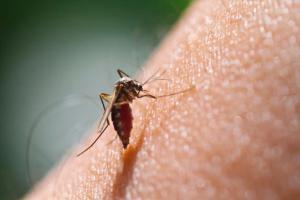According to the researchers, cerebral malaria is a severe, life-threatening complication of infection with the Plasmodium falciparum parasite that can infect humans through the bite of Anopheles mosquitoes

Photo used for representational purpose
Using brain imaging techniques, scientists, including those from The Center for the Study of Complex Malaria in Odisha, have unravelled the century old mystery of how malaria affects the brain, an advance which reveals how the deadly disease causes different outcomes in adults and children.
ADVERTISEMENT
According to the researchers, cerebral malaria is a severe, life-threatening complication of infection with the Plasmodium falciparum parasite that can infect humans through the bite of Anopheles mosquitoes.
While a fifth of people with this form of the disease die despite treatment, and neurocognitive after-effects are common in survivors, they said the effects of malaria on the brain have puzzled scientists for the last 100 years.
The study, published in the journal Clinical Infectious Diseases on Wednesday, used cutting-edge MRI scans to compare the changes in the brains of survivors with those who died from the disease across different age-groups.
"For years, scientists have relied on autopsies to understand the pathology of cerebral malaria, but these don't allow you to compare between survivors and fatalities," said Sam Wassmer, a co-lead author of the study from the London School of Hygiene and Tropical Medicine (LSHTM) in the UK.
"By using neuroimaging techniques to see a snapshot of the living brain, we were able to identify the specific cause of death in adults," Wassner said.
In the study, the scientists assessed 65 patients with cerebral malaria and 26 control patients with ''uncomplicated'' malaria, who were being treated at Ispat General Hospital in Rourkela.
They found that brain swelling tends to decrease with the age of the patient, and that, unlike in children, there was no correlation between brain swelling and death in adult patients from the same cohort.
Instead, the researchers said fatal adult cases had severe oxygen deprivation affecting all brain structures, compared to only localised oxygen-deprivation in survivors.
They said the findings were corroborated by significantly elevated levels of specific molecules in the blood which indicate oxygen-deprivation.
Based on the results, the researchers believe a system could be developed for the identification of patients at risk of developing fatal disease upon admission that could inform their clinical management.
"The results suggest the tantalising prospect of targeted treatments for cerebral malaria, and we are now planning clinical trials to test whether adjunctive therapies for oxygen-deprivation are effective for adults," said Sanjib Mohanty, study co-lead from the Centre for the Study of Complex Malaria.
"If successful, this could be a significant step toward reducing the death toll of one of the world's most deadly diseases."
Keep scrolling to read more news
Catch up on all the latest Crime, National, International and Hatke news here. Also download the new mid-day Android and iOS apps to get latest updates.
Mid-Day is now on Telegram. Click here to join our channel (@middayinfomedialtd) and stay updated with the latest news
This story has been sourced from a third party syndicated feed, agencies. Mid-day accepts no responsibility or liability for its dependability, trustworthiness, reliability and data of the text. Mid-day management/mid-day.com reserves the sole right to alter, delete or remove (without notice) the content in its absolute discretion for any reason whatsoever
 Subscribe today by clicking the link and stay updated with the latest news!" Click here!
Subscribe today by clicking the link and stay updated with the latest news!" Click here!






